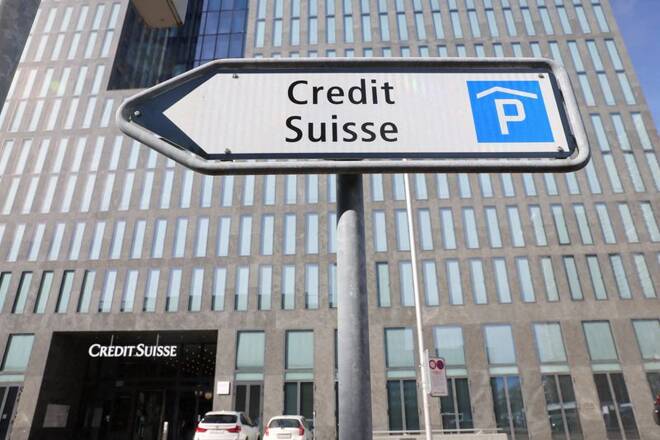Advertisement
Advertisement
What is next for Credit Suisse after cash lifeline?
By:
By Pablo Mayo Cerqueiro, Emma-Victoria Farr and Amy-Jo Crowley
By Pablo Mayo Cerqueiro, Emma-Victoria Farr and Amy-Jo Crowley
LONDON (Reuters) -Credit Suisse’s emergency lifeline from the Swiss central bank has provided the embattled lender with only limited relief, with its battered share price resuming its descent on Friday.
With investor confidence far from restored and markets fearful of a full-blown banking crisis, analysts, investors and bankers think the $54-billion loan facility announced on Thursday has only bought Credit Suisse some time to work out what to do next.
Here are some of the possible scenarios.
Stick it out
Credit Suisse has spent years trying to revive its business after a series of scandals and losses. Chief Executive Ulrich Körner on Thursday vowed to continue with its “strategic transformation” to deliver a simpler and nimbler bank, focusing on managing money for the wealthy.
So, with the Swiss National Bank’s boosting its liquidity, sticking it out with the turnaround strategy may seem appealing for now.
But some analysts think the loss of market confidence will eventually force management’s hand.
“In our view, status quo is no longer an option as counterparty concerns are starting to emerge,” JPMorgan analysts wrote in a research note on Thursday.
Break it up
Switzerland’s second-biggest bank, already cutting jobs and shrinking, could be looking at its options to sell off parts of its business to raise fresh capital.
What happens to the long-underperforming investment bank is key: expedite plans to shrink the fixed income and equity trading businesses or wind up the investment banking operation entirely, are some options.
As part of the overhaul announced in October, it is seeking to spin off merger advice and leveraged finance into a new entity named Credit Suisse First Boston (CSFB), for which it has been seeking buyers.
The bank may see more sense in monetising some its existing units.
Credit Suisse is most valuable in separate parts, and there are high-level M&A talks taking place, said a senior banker who advises banks on deals.
Domestic rivals like private bank Julius Baer could be interested in parts of the business, the banker said, while Bloomberg reported last month Deutsche Bank had eyed the asset and wealth management operations.
Credit Suisse could also pique the interest of other large European lenders, such as Italy’s UniCredit, but the complexities of a deal, including persuading regulators, might discourage buyers, the banker added.
According to investment bank KBW’s calculations, more than 12 billion Swiss francs ($12.9 billion) of value is trapped in Credit Suisse’s domestic retail bank, larger than the group’s current market capitalisation.
The SNB will probably have insisted on a timeline and solution when it stepped in, the banker said.
However, Credit Suisse’s profitable private banking business, serving the world’s wealthy, is arguably the bit management and Swiss authorities will want a shrunken bank to retain.
“It would be a pyrrhic victory to weather the storm and continue to trade independently if doing so stunted its recovery potential,” said Guy Foster, chief strategist at wealth manager RBC Brewin Dolphin.
Takeover
Selling off parts of Credit Suisse could require time, which markets may not give. A more decisive solution could be an outright takeover by a rival.
Analysts point to its bigger domestic rival UBS as the main game in town, although it would need Swiss authorities to support and consider competition concerns.
“I don’t think UBS was super keen on this, but at the current price it might be a different story,” said Jerome Legras, head of research at Axiom Alternative Investments, an investor in Credit Suisse debt.
The two have complementary investment banking businesses -Credit Suisse is stronger in credit and UBS in equities.
But a deal would likely trigger asset sales to try to address overlaps between the banks, Legras said. Even then, regulators might not be convinced of the outcome, a second banker added.
Resolution
Few think shutting down the group is the more likely outcome, given the damage Credit Suisse’s demise would cause to Switzerland’s reputation as a stable and successful financial hub. It would also rattle global finance.
Should the bank’s counterparties stop trading with it, or depositors flee the bank in ever larger numbers, analysts believe Swiss authorities would come to the rescue, possibly by back-stopping all deposits or making a direct equity injection.
But those options would expose Swiss taxpayers to huge risks too, evoking tough memories of the 2008-2009 financial crisis.
However, some have faith that Credit Suisse can still make it safely to the end of the tight rope. “It’s a precarious equilibrium, but it stands a chance of holding,” RBC Brewin Dolphin’s Foster said.
($1 = 0.9304 Swiss francs)
(Additional reporting by Andres Gonzalez in London and Mathieu Rosemain in ParisEditing by Tommy Reggiori Wilkes and Anna Driver)
About the Author
Reuterscontributor
Reuters, the news and media division of Thomson Reuters, is the world’s largest international multimedia news provider reaching more than one billion people every day. Reuters provides trusted business, financial, national, and international news to professionals via Thomson Reuters desktops, the world's media organizations, and directly to consumers at Reuters.com and via Reuters TV. Learn more about Thomson Reuters products:
Advertisement
